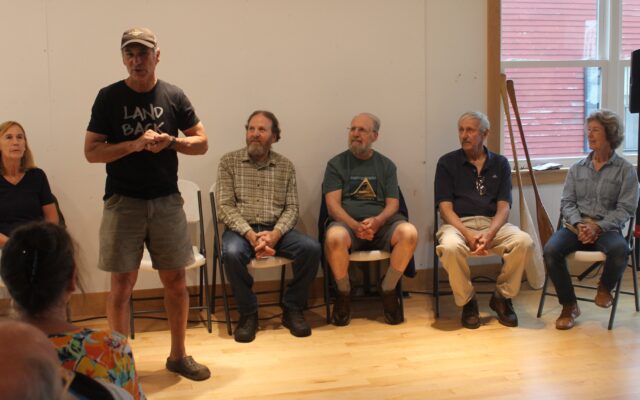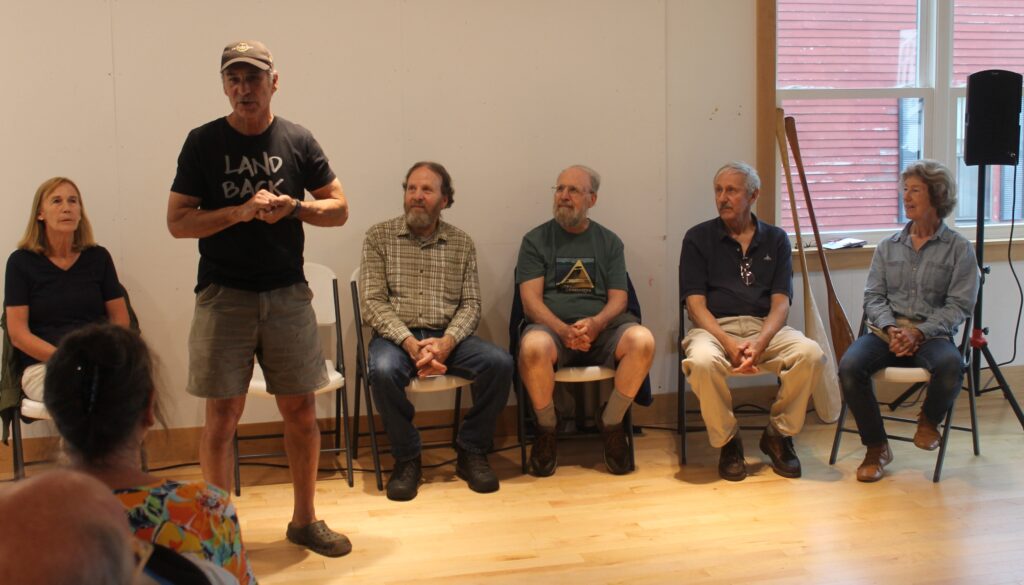
Master canoe artisans honored
MONSON — Five master canoe artisans were honored for their craft and skill and efforts to preserve traditions thousands of years old. Steve Cayard, birch bark canoe maker; Barry Dana, a member of the Penobscot nation and birch bark traditional artist; Rollin Thurlow and Jerry Stelmok, wood-canvas canoe makers; and Alexandra Conover Bennett, paddle maker and master Maine guide were each presented with Legislative Sentiments during Monson Arts and Cultural Resources’ “Canoe Land” at the Moore Building on July 15 as part of Monson Summerfest.
Monson Arts Senior Advisor Stuart Kestenbaum said when the organization was first envisioned those involved wanted it to be a place for arts creativity for people to come from all over to work in studios and “at the same time to recognize the culture and heritage that has been here all along and this is a manifestation of it.”
Looking out at Lake Hebron and seeing canoes, Kestenbaum acknowledged that the audience is situated in the homeland of the Wabanaki people. He said they should be honored along with the Penobscot, Passamaquoddy Maliseet, and Mi’kmaq tribes who have been stewards of the land and waterways for generations.

CANOE LAND — Barry Dana speaks at a “Canoe Land” panel discussion at the Moore Building as part of Monson Summerfest on July 15, after he and four other master canoe artisans were presented with Legislative Sentiments. Sitting are, from left, Kathleen Mundell, director of the Camden-based Cultural Resources, Steve Cayard, Rollin Thurlow, Jerry Stelmok, and Alexandra Conover Bennett.
Kestenbaum said there were individual Legislative Sentiments for the five to recognize their work. “It is such an incredible tradition in Maine of beautiful and functional canoes,” he said.
The sentiment notes, “This Wabanaki tradition has been sustained for centuries by Wabanaki and Northwoods makers, whose creativity, skill and knowledge of materials, design and construction serve as a model for future makers and generations to come.”
Kathleen Mundell, director of the Camden-based Cultural Resources, said, “I think that is a testimony to how special this region is. Going back to when the Wabanaki first started making canoes to now, there really are exceptional makers in our midst that work out of small studios and maybe we don’t know about them but this is really a hub for canoe making, paddle making, and birch bark work in the whole country.”
During the morning and afternoon “Canoe Land” featured outdoor demonstrations and following the Legislative Sentiment presentation the five took part in a panel discussion.
The event was the culmination of a year-long research project conducted by Mundell, documenting woodworking traditions in the region. The project is supported by a grant from the Folk Arts Program of the National Endowment for the Arts.